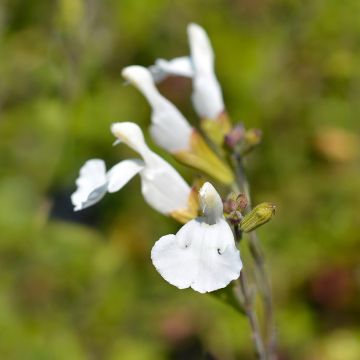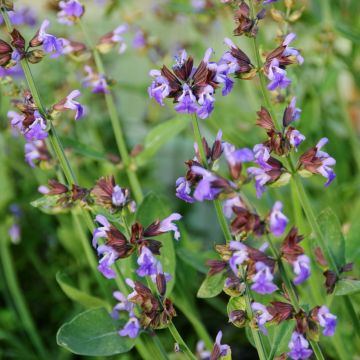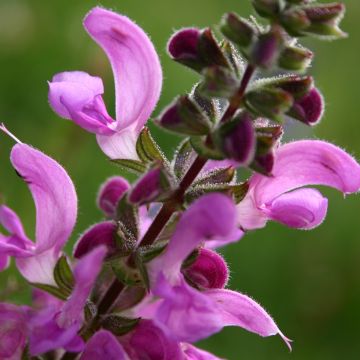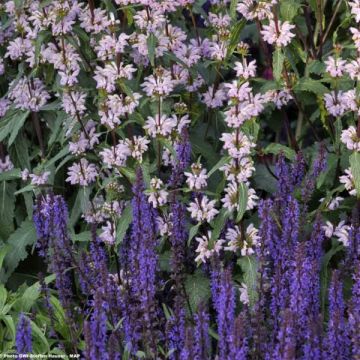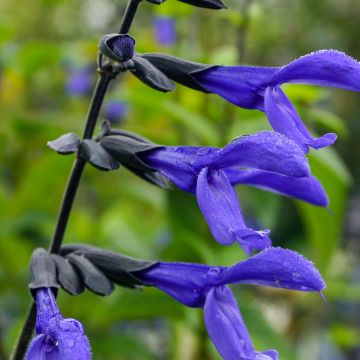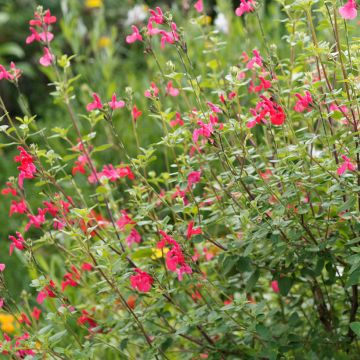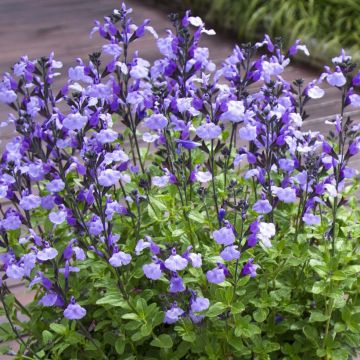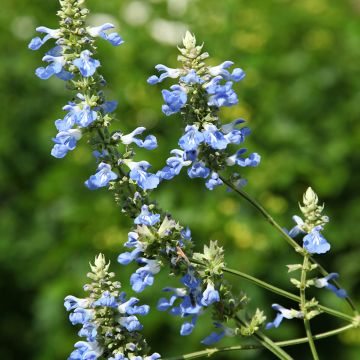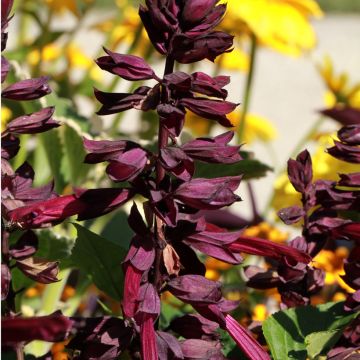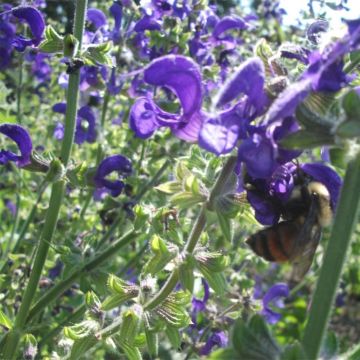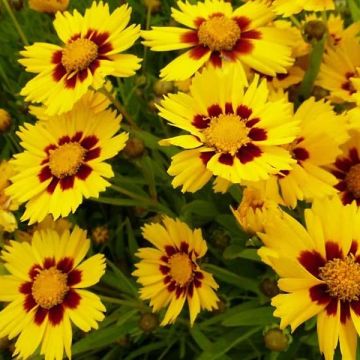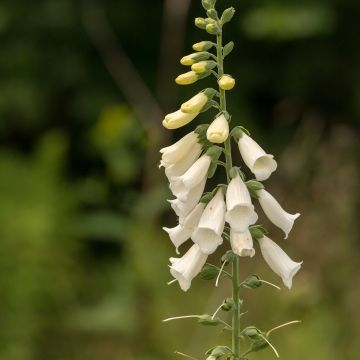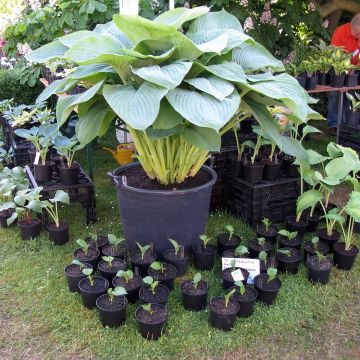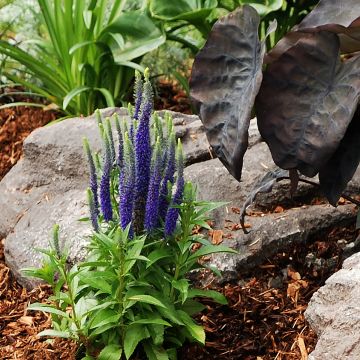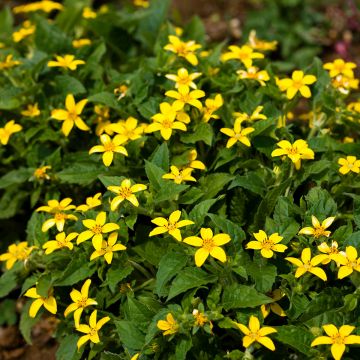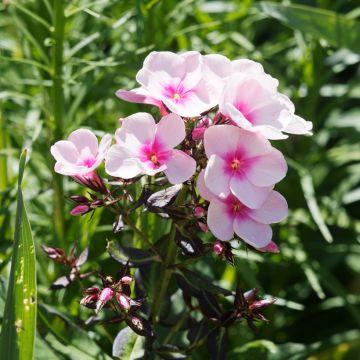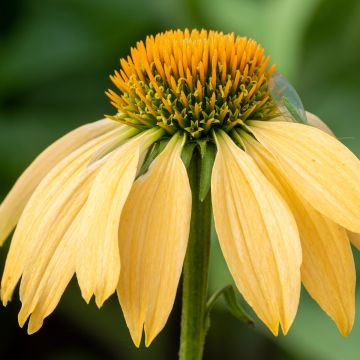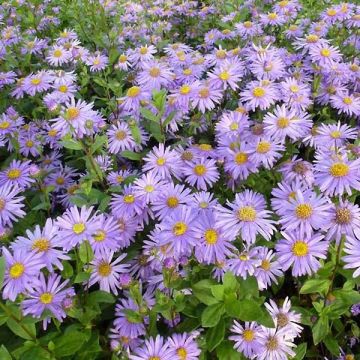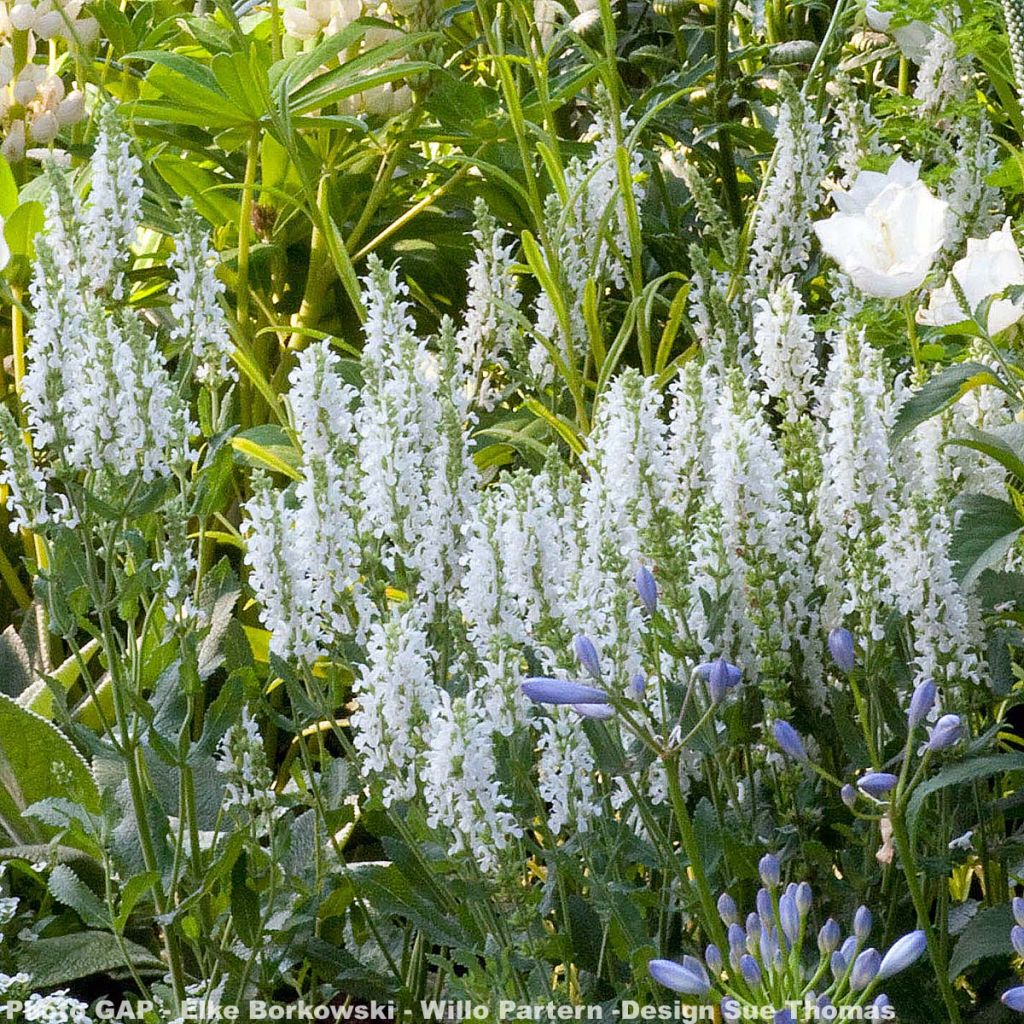

Salvia nemorosa Schneehügel - Woodland Sage
View more pictures
Hide images
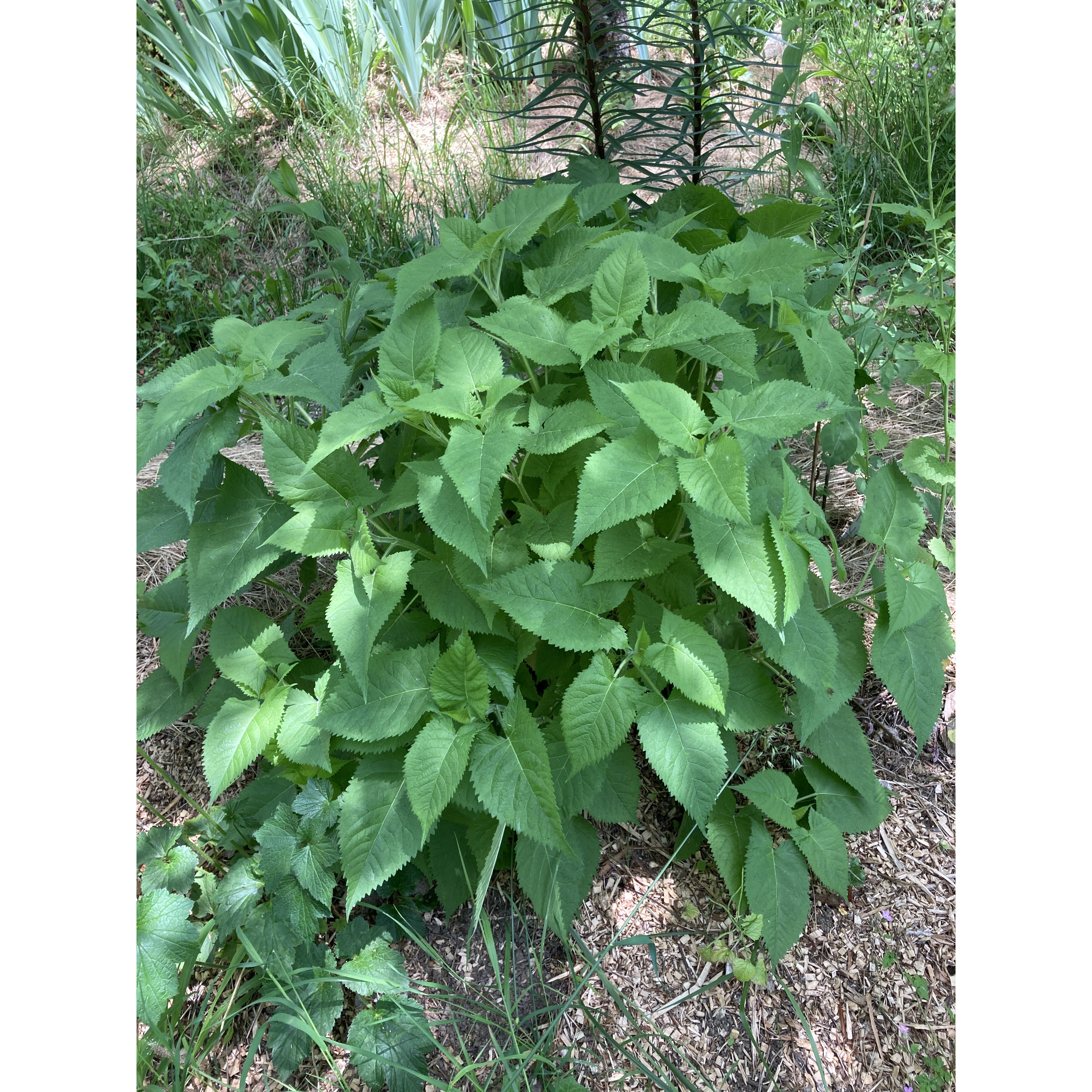
Anna L.

Wood Sage 1 year
Anna L. • 01 FR
Salvia nemorosa Schneehügel - Woodland Sage
Salvia nemorosa Schneehügel
Woodland Sage, Balkan Clary
Sages with abundant flowering that arrived in excellent condition and thrived very quickly, they were magnificent all summer. I love the scent of the foliage as soon as it's crushed!
Catherine, 09/12/2025
Special offer!
Receive a €20 voucher for any order over €90 (excluding delivery costs, credit notes, and plastic-free options)!
1- Add your favorite plants to your cart.
2- Once you have reached €90, confirm your order (you can even choose the delivery date!).
3- As soon as your order is shipped, you will receive an email containing your voucher code, valid for 3 months (90 days).
Your voucher is unique and can only be used once, for any order with a minimum value of €20, excluding delivery costs.
Can be combined with other current offers, non-divisible and non-refundable.
Home or relay delivery (depending on size and destination)
Schedule delivery date,
and select date in basket
This plant carries a 12 months recovery warranty
More information
We guarantee the quality of our plants for a full growing cycle, and will replace at our expense any plant that fails to recover under normal climatic and planting conditions.
Would this plant suit my garden?
Set up your Plantfit profile →
Description
Salvia nemorosa 'Schneehügel', or wood sage 'Schneehügel', is a robust perennial that is easy to grow in all regions. It produces a multitude of flowers throughout the summer. This naturally compact variety bears an abundance of small white flowers, grouped on long spikes. They dominate a clump of very dark green foliage, which is pleasantly aromatic. This hardy, compact, and bright plant is easy to associate in flower beds as well as in flowering pots.
Salvia nemorosa is a perennial of the Lamiaceae family. It is a species native to central Europe and western Asia. The cultivar 'Schneehügel', obtained in Germany, is characterised by a compact, ball-shaped habit and a very long white flowering, which lasts for several months.
It presents itself as a ramified clump, whose adult size will not exceed 50cm (20in) in height when flowering, 35cm (14in) for the foliage, and 40cm (16in) in width. This perennial develops in spring, starting from a prostrate rosette of ovate, rough, very dark green leaves with dentate edges, which are aromatic when crushed. It shows a bushy, very branched and sturdy habit. Flowering begins in May-June and continues until August, depending on the climate, in the form of terminal clusters carrying numerous small white flowers (0.5 to 1cm (1in)), with green bracts. The beautiful flower spikes are rich in nectar and delight bees and butterflies. The vegetation of this sage will persist in winter. Its cold-resistant stump does not fear harsh winters if the soil is properly drained.
Plant the 'Schneehügel' sage in mixed borders, flower beds, or as a standalone plant, alongside heathers, hebes, or anemones, for example. It is an excellent candidate for ornamenting patios and balconies, but also ideal in low-maintenance flower beds. Easy to grow almost everywhere, it is also one of the hardiest sages, and as such, a fantastic garden perennial that will not disappoint. It withstands everything, even wind, cold, heat, and poor soils. This variety is particularly suitable for a white garden, for example, bordering a path, but it easily associates with all types of flowers. It will be superb in the company of pink flowering plants like 'The Fairy' rose, a red rose for a strong contrast ('Knockout'), or with perennial geraniums. It also pairs well with shrubby lavenders, penstemons, and peonies.
With over 900 species of annuals, perennials, and softwood shrubs distributed throughout the globe (except for very cold regions and tropical forests), the Salvia genus is the richest in the Lamiaceae family. The name Salvia, dating back to Roman times, derives from the Latin salvus, meaning "healthy", in reference to the medicinal properties of common sage.
Report an error about the product description
Salvia nemorosa Schneehügel - Woodland Sage in pictures
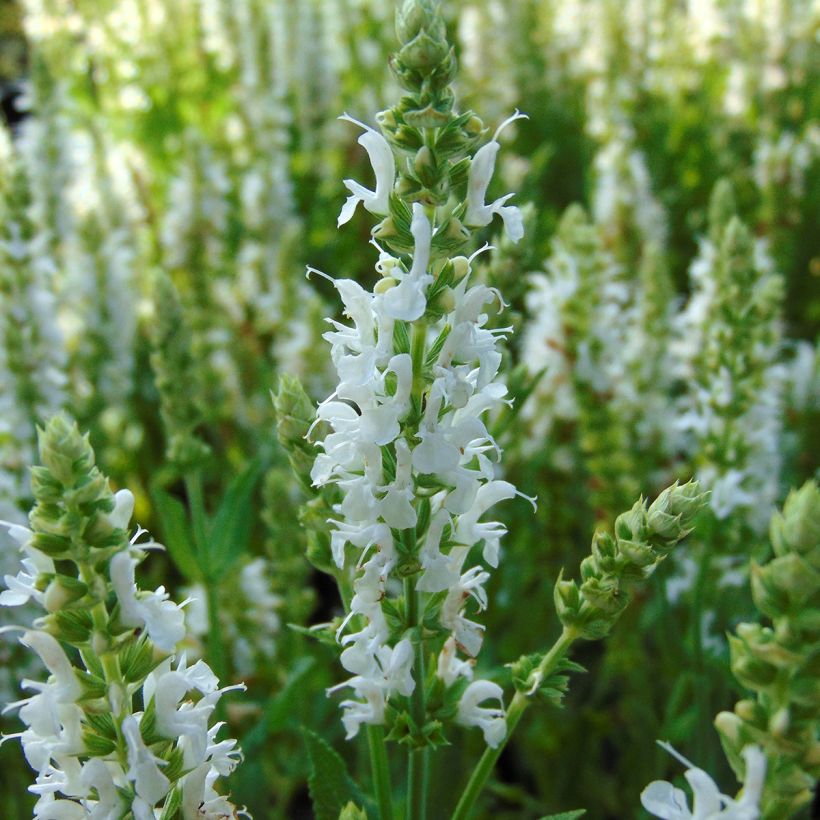

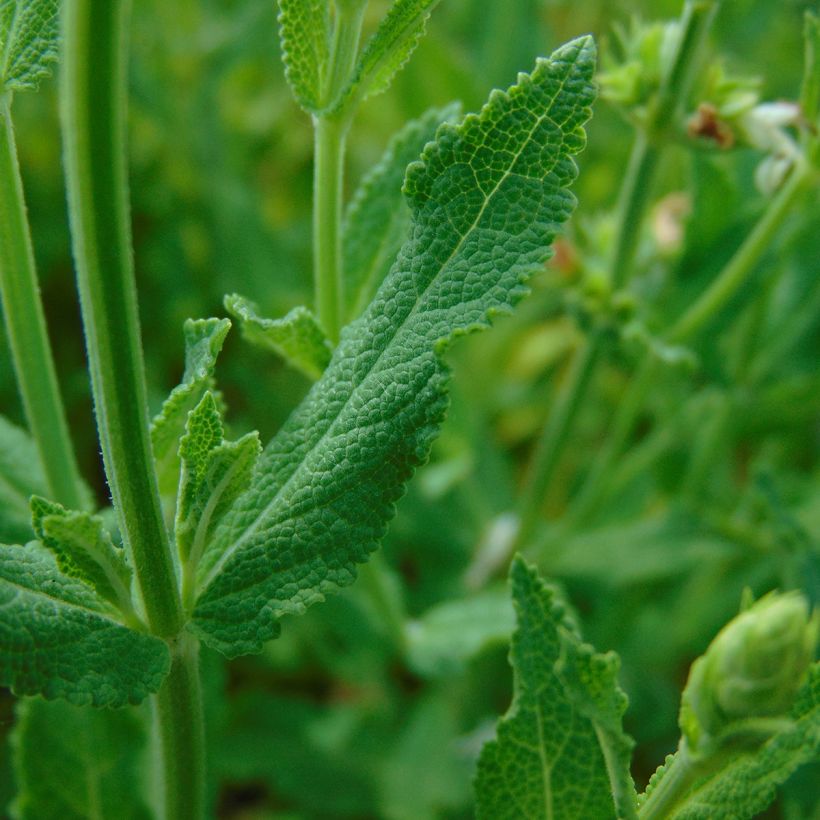

Flowering
Foliage
Plant habit
Botanical data
Salvia
nemorosa
Schneehügel
Lamiaceae
Woodland Sage, Balkan Clary
Cultivar or hybrid
Other Salvia - Sage
View all →Planting and care
Plant Salvia nemorosa 'Schneehügel' in ordinary soil, even poor and rather chalky, but above all well-drained. This plant tolerates some drought, at the expense of flowering, however. It does not appreciate heavy and waterlogged soils in winter, which can harm its hardiness. Plant it in a sunny exposure. It is an easy plant, very floriferous. Give it fertiliser in spring. In April, prune all the branches in half. After flowering, cut the faded flower stems to stimulate and prolong flowering. Divide the plant after 3 years to maintain its vitality. Plant the new divisions in well-worked soil. To improve slightly poor soil, mix in some horticultural compost. In cold areas and in humid regions, use a mineral mulch (gravel, pumice, pebbles) about 4 to 6cm (2in) thick to drain the collar of the plant.
Planting period
Intended location
Care
-
, onOrder confirmed
Reply from on Promesse de fleurs
Similar products
Haven't found what you were looking for?
Hardiness is the lowest winter temperature a plant can endure without suffering serious damage or even dying. However, hardiness is affected by location (a sheltered area, such as a patio), protection (winter cover) and soil type (hardiness is improved by well-drained soil).

Photo Sharing Terms & Conditions
In order to encourage gardeners to interact and share their experiences, Promesse de fleurs offers various media enabling content to be uploaded onto its Site - in particular via the ‘Photo sharing’ module.
The User agrees to refrain from:
- Posting any content that is illegal, prejudicial, insulting, racist, inciteful to hatred, revisionist, contrary to public decency, that infringes on privacy or on the privacy rights of third parties, in particular the publicity rights of persons and goods, intellectual property rights, or the right to privacy.
- Submitting content on behalf of a third party;
- Impersonate the identity of a third party and/or publish any personal information about a third party;
In general, the User undertakes to refrain from any unethical behaviour.
All Content (in particular text, comments, files, images, photos, videos, creative works, etc.), which may be subject to property or intellectual property rights, image or other private rights, shall remain the property of the User, subject to the limited rights granted by the terms of the licence granted by Promesse de fleurs as stated below. Users are at liberty to publish or not to publish such Content on the Site, notably via the ‘Photo Sharing’ facility, and accept that this Content shall be made public and freely accessible, notably on the Internet.
Users further acknowledge, undertake to have ,and guarantee that they hold all necessary rights and permissions to publish such material on the Site, in particular with regard to the legislation in force pertaining to any privacy, property, intellectual property, image, or contractual rights, or rights of any other nature. By publishing such Content on the Site, Users acknowledge accepting full liability as publishers of the Content within the meaning of the law, and grant Promesse de fleurs, free of charge, an inclusive, worldwide licence for the said Content for the entire duration of its publication, including all reproduction, representation, up/downloading, displaying, performing, transmission, and storage rights.
Users also grant permission for their name to be linked to the Content and accept that this link may not always be made available.
By engaging in posting material, Users consent to their Content becoming automatically accessible on the Internet, in particular on other sites and/or blogs and/or web pages of the Promesse de fleurs site, including in particular social pages and the Promesse de fleurs catalogue.
Users may secure the removal of entrusted content free of charge by issuing a simple request via our contact form.
The flowering period indicated on our website applies to countries and regions located in USDA zone 8 (France, the United Kingdom, Ireland, the Netherlands, etc.)
It will vary according to where you live:
- In zones 9 to 10 (Italy, Spain, Greece, etc.), flowering will occur about 2 to 4 weeks earlier.
- In zones 6 to 7 (Germany, Poland, Slovenia, and lower mountainous regions), flowering will be delayed by 2 to 3 weeks.
- In zone 5 (Central Europe, Scandinavia), blooming will be delayed by 3 to 5 weeks.
In temperate climates, pruning of spring-flowering shrubs (forsythia, spireas, etc.) should be done just after flowering.
Pruning of summer-flowering shrubs (Indian Lilac, Perovskia, etc.) can be done in winter or spring.
In cold regions as well as with frost-sensitive plants, avoid pruning too early when severe frosts may still occur.
The planting period indicated on our website applies to countries and regions located in USDA zone 8 (France, United Kingdom, Ireland, Netherlands).
It will vary according to where you live:
- In Mediterranean zones (Marseille, Madrid, Milan, etc.), autumn and winter are the best planting periods.
- In continental zones (Strasbourg, Munich, Vienna, etc.), delay planting by 2 to 3 weeks in spring and bring it forward by 2 to 4 weeks in autumn.
- In mountainous regions (the Alps, Pyrenees, Carpathians, etc.), it is best to plant in late spring (May-June) or late summer (August-September).
The harvesting period indicated on our website applies to countries and regions in USDA zone 8 (France, England, Ireland, the Netherlands).
In colder areas (Scandinavia, Poland, Austria...) fruit and vegetable harvests are likely to be delayed by 3-4 weeks.
In warmer areas (Italy, Spain, Greece, etc.), harvesting will probably take place earlier, depending on weather conditions.
The sowing periods indicated on our website apply to countries and regions within USDA Zone 8 (France, UK, Ireland, Netherlands).
In colder areas (Scandinavia, Poland, Austria...), delay any outdoor sowing by 3-4 weeks, or sow under glass.
In warmer climes (Italy, Spain, Greece, etc.), bring outdoor sowing forward by a few weeks.






























